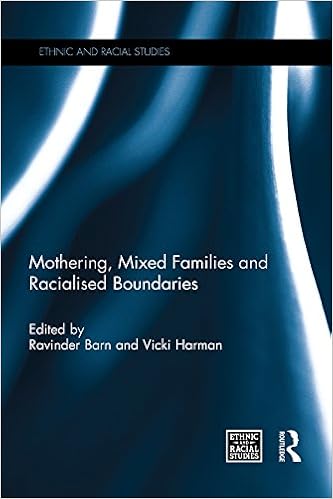Mothering, Mixed Families and Racialised BoundariesPosted in Anthologies, Books, Canada, Census/Demographics, Family/Parenting, Judaism, Media Archive, Religion, Social Work, United Kingdom, United States, Women on 2016-01-02 21:47Z by Steven |
Mothering, Mixed Families and Racialised Boundaries
Routledge
2014-02-10
120 pages
Paperback ISBN: 9781138953697
Hardback ISBN: 9780415733748
Edited by:
Ravinder Barn, Professor of Social Policy
Royal Holloway, University of London, United Kingdom
Vicki Harman, Senior Lecturer
Royal Holloway, University of London, United Kingdom
This pioneering volume draws together theoretical and empirical contributions analyzing the experiences of white mothers in interracial families in Britain, Canada and the USA. The growth of the mixed race population reflects an increasingly racially and culturally heterogeneous society, shaped by powerful forces of globalisation and migration. Mixed family formations are becoming increasingly common through marriage, relationships and adoption, and there is also increasing social recognition of interracial families through the inclusion of mixed categories in Census data and other official statistics. The changing demographic make-up of Britain and other Western countries raises important questions about identity, belonging and the changing nature of family life. It also connects with theoretical and empirical discussions about the significance of ‘race’ in contemporary society.
In exploring mothering across racialised boundaries, this volume offers new insights and perspectives. The notion of racialisation is invoked to argue that, while the notion of race does not exist in any meaningful sense, it continues to operate as a social process. This crucial resource will appeal to academics, researchers, policy makers, practitioners and undergraduate and postgraduate students.
This book was originally published as a special issue of Ethnic and Racial Studies.
Table of Contents
- Introduction / Ravinder Barn and Vicki Harman
- ‘Doing the right thing’: transracial adoption in the USA / Ravinder Barn
- The experiences of race in the lives of Jewish birth mothers of children from black/white interracial and inter-religious relationships: a Canadian perspective / Channa C. Verbian
- Researching white mothers of mixed-parentage children: the significance of investigating whiteness / Joanne Britton
- Social capital and the informal support networks of lone white mothers of mixed-parentage children / Vicki Harman
- Narratives from a Nottingham council estate: a story of white working class mothers with mixed-race children / Lisa McKenzie
